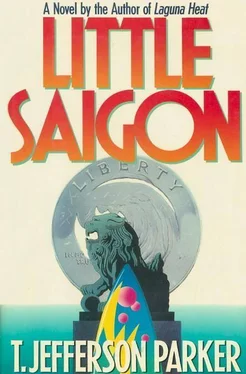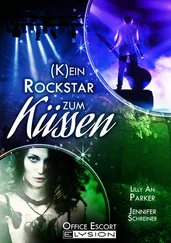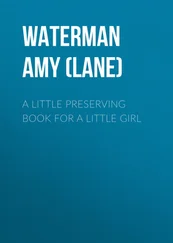“Stanley... lại cái! Goddamn this tape!”
Li finished the song with a note so high and pure that Frye feared for his vodka glass. She bowed, black hair cascading down. The applause seemed to force a gust of smoke toward the ceiling. Bennett shot Chuck a proud look as the spotlights found their table again.
Before he knew he was doing it, Frye had gotten up and hugged his brother, patting him on the back. The applause got louder. Then the light reapplied itself to Li, who had turned to her band to count down the next tune. Strange, thought Frye, as he sat back down, how in the middle of everything you find yourself just plain happy. Bennett was nodding at him. Kim leaned close again. “This is a new song, Chuck. About our home, and being heartsick for what you cannot have.”
Li looked out over her audience, then spoke over the oddly syncopated rhythm of her band. “Vietnam, where are you? We must learn the language of getting you back.”
The guitar opened, mournfully high and lonesome.
“I’m sorry for you people,” Frye blurted past a wisp of black hair and into Kim’s ear.
She looked at him in assessment. “You tried.”
“No, I didn’t. Not me.”
I didn’t do a damn thing, he thought: Bennett paid the family price. I didn’t argue with draft number three-fifty-one. He drank more, guilty again that it was Bennett who had gone, Bennett who had lost. But he had won, too: a wife, and a life among the people for whom he had given so much. Chuck looked at his brother, wondering for the thousandth time if the trade was worth it. Half a man now, roughly — head, torso, arms, and two stumps. He looked at Donnell Crawley, the grunt who had carried Bennett back to safety, jammed his helmet onto one of Bennett’s gushing thighs, and gotten shot in the head for his trouble.
Frye glanced around for Eddie Vo, but Eddie Vo was gone. So was Sunglasses. The tape recorder sat by their beer bottles, a gutted cassette on the table beside it.
Weird-ass time to go outside and smoke one, Frye thought. Miss Saigon Days’ father stood and came toward their table, smiling.
When three hooded figures walked to the front of the stage and lowered machine guns at the crowd, Frye thought it was part of the show. For the shortest of moments — between the fall of the drumsticks, between Li’s melancholy lines, between the beats of Frye’s heart — the Asian Wind went quiet.
Then gunfire shattered the submarine light, splashing mirror glass as if it were water. There was a collective heave, the crashing of bodies on furniture. Li hurled her mike at one of the intruders, then grabbed her stand and lifted it high above a gunman in a ski mask. But he jumped the stage, slipped inside her blow, and clenched her around the neck. Another, wearing a black hood, grabbed a backup singer, then let go, whirled around, and helped the man in the ski mask grapple with Li. Her hair splayed in the spotlight and a pale curve of shoulder flashed where the silk ripped apart in gloved hands.
Frye reached out and grabbed the beauty queen’s father by his necktie. In the unbelievably long moment that it took to hit the floor, all he could think about were the people he should have treated better before he died.
Bennett landed beside him, rolled over and righted himself. Up on his fists now, with his stumps swinging between his thick arms, Bennett charged the stage. Shards of glass sprinkled down like rain. Frye saw the machine gun fix on Bennett and thought: All the way to Vietnam and back, and he’s going to die crawling across a barroom floor.
For one blessed second, the gunman hesitated.
Frye jumped up and dove for Bennett. So did Burke Parsons, his Stetson flying off. With his arms locked around his brother’s chest, Frye looked up through the stampede to see Li being dragged toward the rear exit. Her feet flailed uselessly above the floor — one shiny black shoe flying off.
Beside them, General Dien raised a pistol and fired. The gunman on stage jerked as a bright crimson-halo burst behind his head. His weapon pumped bullets into the stage until it finally fell from his hand and clattered to the floor.
Frye fought to his feet, lunged through the crowd and through the back door. A blue Celica ripped from the parking lot in a puff of tire smoke and sped around a corner.
He jumped into his old Mercury, started it up, and slammed it into gear.
His headlights raked the lot, and for a brief illuminated second he saw what looked like Eddie Vo’s wide-eyed face staring back at him from the front seat of a parked station wagon.
Then Frye was screaming for Bennett against the wail of his own tires, in a voice he could hardly hear. Just as he skidded up to the rear door, Donnell Crawley burst out, carrying Bennett in his arms.
He was off, Bennett next to him on the big bench seat, Crawley riding shotgun. Bennett yelled in his ear. “Get on it! Go!”
He bounced the Cyclone onto Brookhurst and floored it. Police sirens started to wail. Up the broad, busy street, the Celica slanted into the slow lane and swung right onto Westminster Boulevard. Frye steered around a lame Volkswagen, ate a hundred yards of asphalt in one gulp, then slid through the corner gas station, pumps and astonished attendants flying past his ears. “Faster,” screamed Bennett. “They’re going left, they’re going left!”
The big V-8 rush pinned them to the upholstery and Frye cut the distance — a hundred yards... fifty — but the Celica waited until the oncoming traffic was bunched and heading toward them before it lurched across and disappeared down Magnolia. He skidded to a stop in a chorus of horns. Two police units howled past him, sirens high. Six cars... seven... ten and still coming while they waited there, staring down Magnolia as if willpower could slow the escape of the Celica. Frye finally gave up and punched it in front of an OCTD bus, which lowered heavily like some great animal amidst its own brake lights and tire smoke as they shot by.
Far ahead of them, the blue Celica turned left again.
Bennett reached out and turned the wheel, jumping the Cyclone into the left lane. “Left on Green Flower, next light. They’re heading for the plaza!”
Frye jumped the median, clipped a street sign, and barged past the cars lining up in the turn lane. When the oncoming traffic broke, he lumbered onto the street again and swung left onto Green Flower. In the distance Frye could see the lights of Saigon Plaza, the archway at the entrance. Two beams of light funneled up and crisscrossed in the sky overhead. “They’re going to the plaza, I know it. Get on it, Chuck, goddamn it, move.”
They came into Saigon Plaza from the back, squeezing along the narrow alley between Thanh Tong Fabrics and the office of Dang Long Co, M.D. Streetlamps lined the sidewalk. The shops and buildings with their bright signs and painted windows sat behind them. Cars filled the parking lot, flyers glided along the asphalt in the warm breeze. To his left Frye could see the huge archway and the two marble lions standing guard at the main entrance off Bolsa.
Bennett reached over and took the wheel, guiding them to the right. His voice was quiet, almost a whisper. “Go slow and hug the perimeter, Chuck. She’s in here somewhere. Donnell, call the cops and give them the car make.”
Crawley jumped out and ran toward the shops.
“Someone must have seen them,” said Frye.
“They won’t tell us shit,” Bennett said.
Frye cruised. Crowded sidewalk, windows, groups of refugees looking on with curiosity. Hãng Du Lịch Bát Đạt Travel, Bổng Loi Seafood Company, Tài Lọi Donuts and Hot Food. Banners everywhere: FINAL SALE! CLEARANCE SALE! CELEBRATE SAIGON DAYS — THE CITY OF WESTMINSTER. Pop music came from Tranh Cafe, a group of young men hanging around in front.
Читать дальше












